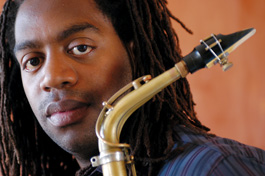home | metro santa cruz index | columns | the rock show

All Fon All the Time : Terry's latest effort focuses on the music of Cuba's Arará people, who are descended from the Fon of Benin in West Africa.
Roots Music
Cuban saxophonist Yosvany Terry dives deep into the Afro-Caribbean legacy for his Kuumbwa show this week.
By Andrew Gilbert
Like many Cuban jazz musicians, saxophonist Yosvany Terry grew up absorbing chants, rhythms and rituals that can be traced directly to the Yoruba people of West Africa.
It's only in recent years, however, that he's immersed himself in one of Afro-Cuban culture's more obscure currents, delving into the folkloric traditions of the Arará people from the island's northwestern province of Matanzas. The scion of a highly respected musical family, Terry was already a rising star in Cuba who had played with giants such as pianist Chucho Valdez, singer/songwriter Silvio Rodriguez and trumpeter Jesús Alemany's band Cubanismo before moving to New York in 1999. A major force on the American jazz scene who's been touring internationally with Cuban pianist Gonzalo Rubalcaba, Terry devoted his second release, Ye-dé-gbé: Afro-Caribbean Legacy, to an electrifying synthesis of state-of-the-art post-bop improvisation and Arará musical forms.
"A lot of the material I was working with was new to me, and writing the music demanded a lot of research," says Terry, who presents the Ye-dé-gbé project in a series of Bay Area gigs, including Saturday afternoon at the Yerba Buena Gardens Festival in San Francisco, Sunday at the Stanford Jazz Festival and Monday at Kuumbwa.
As a center of sugar cane production with a large population of both free Afro-Cubans and slaves, Matanzas was (and still is) a particularly vital center of Afro-Cuban culture, particularly for the Arará, who hail from the Dahomey kingdom's Fon people in what is now Benin. Terry became fascinated by Arará traditions and spent a year traveling to Matanzas, where he studied with Mario Rodriguez Pedroso, one of the last surviving drummers initiated into Arará rituals. He also tapped into Afro-Cuban masters in New York City and musicians from Benin.
"Once I was dealing with all this information, I sat down and started to develop the concept of the music," Terry says. "I didn't just want to reconstruct their legacy. I needed to put it in consonance with the concept I've been doing with my band, take the legacy that arrived 500 years ago, and bring it back to life and mix it with the musical and aesthetic concept I've been working with in New York."
When he premiered the music in Central Park last September, he commissioned a set of massive Arará drums for the project, drums featured throughout Ye-dé-gbé. For his Bay Area concerts, Terry is performing with almost the same cast featured on the album, a dazzling collection of musicians including his brother, bassist Yunior Terry, pianist Osmany Paredes, drummer Tony Escapa, Pedro Martinez on vocals and percussion and percussionists Roman Diaz and Ramon "Sandy" Garcia Perez (who was born and raised in Matanzas).
In an unexpected twist, Terry discovered while researching the project that he was already familiar with several Arará rhythms and melodies from his family's Vodou rituals, a spiritual discipline passed on from his Haitian grandmother, who traces her ancestors back to Dahomey. While he explored various manifestations of Fon culture across the Caribbean and South America, Terry ended up composing music steeped in specifically Arará forms, creating music that's elemental and bracing, powered by ancient rhythms and informed by utterly contemporary jazz harmonies.
"I know you can see the same Fon legacy in Brazil in Bahia and in the Dominican Republic," Terry says. "In Puerto Rico you can see the lineage coming from Haiti too in the drums for bomba. I was able to look into all of them, but if you try to be everywhere, you can lose your focus."
YOSVANY TERRY plays Monday, July 21, at 7pm at Kuumbwa Jazz Center, 320-2 Cedar St., Santa Cruz. Tickets are $22 advance/$25 door; 831.427.2227 or www.kuumbwajazz.org.
Send a letter to the editor about this story.
|
|
|
|
|
|